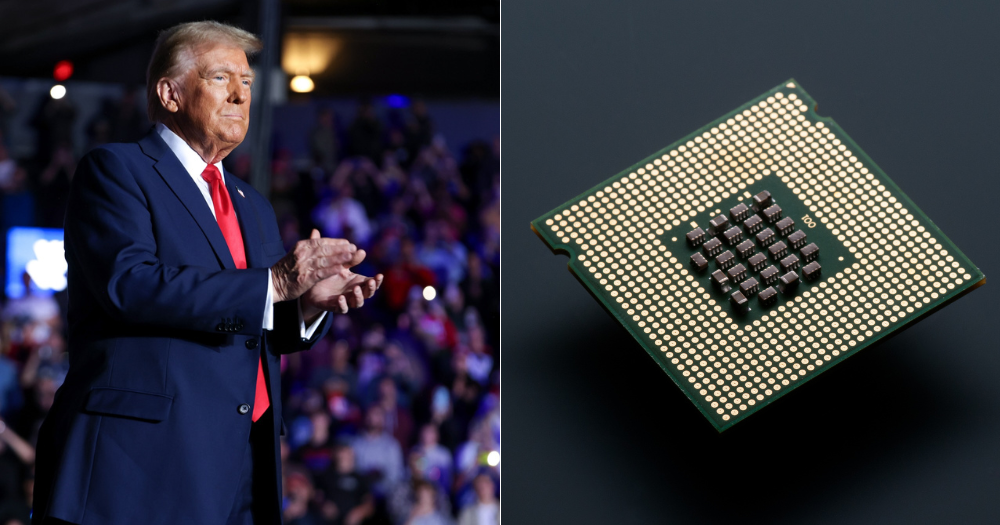
Opinion: Trump’s 100% Semiconductor Tariff Could Hit Malaysia Hard
11 Aug 2025 • 7:00 AM MYT

TheRealNehruism
Writer. Seeker. Teacher

Image credit : Mothership
Barely a week ago, Malaysia’s relationship with the United States appeared to be on the upswing.
First, US President Donald Trump initiated ceasefire talks between Cambodia and Thailand, and Prime Minister Anwar Ibrahim successfully completed the negotiations. Trump even publicly praised Anwar, saying he had done “a fanstastic job.”
Then came what was seen as another breakthrough—Anwar personally engaged with Trump just before the 1st August deadline of the new 25% US tariff on Malaysian goods. Through what was portrayed as savvy diplomacy, Malaysia secured a reduction of the tariff to 19%.
In both substance and symbolism, these developments were read as positive signs of a warming relationship between the two countries. Business leaders in Malaysia were cautiously optimistic that economic cooperation—especially in key sectors like semiconductors—would deepen.
But today, on 7 August, we’ve all woken up to a rude awakening.
Trump has now declared that a 100% tariff will be imposed on semiconductor imports from countries not producing within the US—or at least not planning to do so. It’s a stark reminder that no matter how many agreements or good-faith negotiations you enter into, if the other party’s fundamental intention is self-interest at your expense, you are bound to lose.
And Malaysia, as the world’s sixth-largest semiconductor exporter, may be standing directly in the line of fire.
Electrical and electronics (E&E) exports from Malaysia surpassed RM600 billion last year, and about 60% of our exports to the US are in this sector. Of these, 68% are semiconductors, and 65% of that is exported by American companies operating in Malaysia.
600 billion is no joke. For contrast, Malaysian GDP for the year 2024 was about RM 1.8 trillion. The size of our E&E sector in other words, is a third of of GDP. That is immense.
Although the 100% tariff announcement was informal and lacks immediate specifics, the implications are chilling. Trump’s remarks indicate a clear intent to force semiconductor production back to US soil—rewarding firms that invest domestically, and punishing those who don’t.
So much is at stake for Malaysia. And if Trump’s tariffs hit us directly, the blow will be heavy.
While Investment, Trade, and Industry Minister Tengku Zafrul Aziz has publicly stated that Malaysia’s semiconductor exports to the US are currently exempt, the exemption looks dangerously fragile.
His own words—“subject to review and could change at any time depending on the US administration’s policy direction”—offer little comfort in the face of Trump’s unpredictable trade agenda.
Yes, it is true that 65% of Malaysian semiconductor exports to the US come from American firms like Intel and Texas Instruments, which operate major manufacturing hubs in Malaysia. However, this advantage may not offer lasting immunity.
Trump’s tariff strategy is not just economic policy—it’s political theater. The distinction between “investing in the US” and “already having a US plant” remains vague. There is a very real danger that American firms operating in Malaysia could be pressured to relocate, or face tariffs if their Malaysian-based production doesn’t satisfy Trump’s shifting standards.
Zafrul may believe that Malaysia won’t be significantly impacted, but reality tells a different story. The US is recalibrating its semiconductor supply chain in the name of national security and domestic politics—not partnership or fairness. In this recalibration, even friends can become collateral damage.
In the end, Trump’s tariff threat reveals the limits of diplomacy when it collides with economic nationalism. Malaysia might have delayed the blow with earlier negotiations, but if Washington insists on chips made in America, then Kuala Lumpur’s handshake won’t stop the hammer.
No comments:
Post a Comment